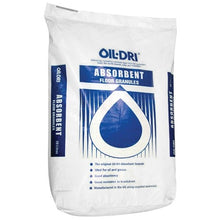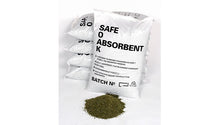Sold in 2 variants: Oil-Dri or Safe Soak
Oil-Dri Absorbent Granules
- Ideal for the quick clean-up of any oil or grease spillage.
- The most popular choice of product in our range of floor absorbents.
- Manufactured under a patented process using re-cycled material.
- Good stability – resistant to traffic.
- Application primarily for oil.
- Medium bulk density & not dusty.
- Source from natural recycled clay.
- Pink / white colour.
- Granular chips.
- Bag size 20 Litres / 16kg.
Half Pallet = 32 bags
Full Pallet = 63 bags
Disposal Information
Oil-Dri products must be disposed of in compliance with local authority guidelines. Because various fluids absorbed may be of toxic or hazardous nature, Oil Dri does not recommend disposal procedures.
Before using this product in a spill incident, a risk assessment should be carried out and the hazardous properties and dangerous reactions should be taken into account.
Safe Soak Absorbent Granules
- Cost effective: 3 times more absorbent than Clay Granules.
- Highly absorbent, capillary action.
- Absorbs immediately on application thus preventing spreading.
- User friendly (light weight bag).
- Does not stick to floor.
- Can be incinerated (7% Ash).
- Dust free.
- Manufactured from sustainable source.
- Re-cycled materials (including packaging).
Half Pallet = 35 bags
Full Pallet = 70 bags
Safe Soak is loose cellulose granules which has been sieved, sized, coloured and chemically treated to make it fire retardant. It has been independently tested at Fire Research centre & complies with BS 476 Class 1 part 7. It is packed in a 30 Litre bag which weighs on average 6-7kgs & has the absorbency power equivalent to 3 bags of clay.
Safe Soak works in a completely different way to clay granules in that it works by capillary action, were the spilt liquid is absorbed into the fibre structure. It starts to work immediately on contact with a liquid. Clay granules absorb, this means liquid sticks (coats) to the granules by surface tension.
Safe Soak can be incinerated so avoiding expensive & ever-increasing land fill taxes. Like all loose absorbents, it will take on the properties of the liquid it's absorbing, so must be disposed of in the correct manner complying with current legislation.




